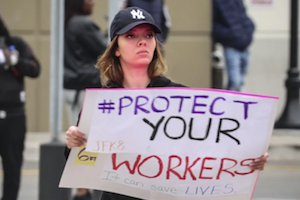
As 30 states across the U.S. have issued stay-at-home directives to enforce social distancing practices to slow the spread of the coronavirus, the economy has come to a screeching halt. While Congress passed a $2 trillion rescue package, that aid will only provide inadequate and temporary relief for working families, many who were already living close to the edge when the pandemic struck. Congress has already recognized that it must quickly provide additional assistance to bridge the gap.
But the temporary relief won’t benefit the nation’s millions of undocumented workers who produce our food, provide health care and assist the sick and elderly. Amazon, Instacart and Whole Foods workers concerned about their own safety in the midst of this deadly virus have organized protests and strikes to demand improved workplace safety and benefits including hazard and sick pay.
At the same time, the pandemic has exposed the gaping holes in our nation’s social safety net and the widening gap between the rich and poor. President Trump has used his megaphone to scapegoat immigrants, the Chinese and others he blames for his own failures of leadership. Between The Lines’ Scott Harris spoke with Rev. Jim Wallis, an author, preacher, justice advocate and founder of Sojourners magazine, who reminds us of the working men and women in our nation who are bearing the heaviest burden during this public health emergency.
REV. JIM WALLIS: This pandemic, this time, is going to reveal what’s already true. And so it’s not a matter of we’ll be better or worse. This reveals who we are right now. It reveals our inequities, our relationships, our systemic realities that we have accepted for a long time and live with day to day. It’s certainly anyone who’s paying attention and sees the inequities in our healthcare system, for example, in our economic systems of employment and lack thereof, in our educational systems. So it’s revealing who we are. And this is going to last for some time. So the question is, what will we see about ourselves in our society, our systems in this time and will we care afterwards about what we’ve seen? It’s showing us a lot and that could change us if we allow ourselves to pay attention.
SCOTT HARRIS: And Rev. Walis, there are specific vulnerable populations at this moment and that includes immigrants who’ve been the target of the Trump administration through ICE raids, mass sweeps, and the imprisonment of tens of thousands of people separated from their families, children in cages. And there’s a lot of scapegoating going on before and during this pandemic. Tell us a bit about your concerns with the Trump administration and their resorting to scapegoatism at a moment of crisis that we are currently suffering through.
REV. JIM WALLIS: This morning I was reflecting on biblical texts because that’s what us reverends do. And in Ephesians Chapter 5:16, it says, “Redeem the time for the days are evil, redeem the time for the days are evil.” Before this coronavirus hit us, the days were evil in all kinds of ways. As you say, migrant kids separated from their parents and put in cages. People who live in fear every day. If they’re a black church pastor, that their kids and their youth group will be racially policed even more. Or immigrant families who wonder if they’ll be together at night. So many things. And yet now this virus has hit us and stopped us and made us go slower and it’s time to pay attention whether undocumented people in detention centers, for example, will be looked after and treated; whether all the people, as you say in our prison system, how they will fare in a time like this.
It’s hard to social distance in prison when this breaks into the Global South. I was talking today to a friend who was on a conference call with church leaders all over the Global South. If this is doing what it’s doing to our hospital systems here, imagine the fragile and sometimes non-existent hospital systems in the Global South, what this will do to them and how do you social distance in refugee camps and all the barrios and the ghetto.
So I think this can really show us, reveal what we have been either ignoring of or silent about for a long time. I also think redeeming the time could mean that we take this time to look at all that, Scott, which you’re raising to look at all that and look at ourselves and will we be — we will be different. This will change us. This is a historical moment. It will change us. We don’t know how yet, whether it will summon our better angels, or our worst demons. These were evil days in this nation before the virus hit. They were evil days — lack of compassion, lack of truth, lack of care. Our worst demons of racism and xenophobia were being evoked every day and yet now we have time perhaps to redeem what this nation could become, but only if we open ourselves to the kinds of change that what we’ve seen can lead us toward.
For more information, visit Sojourners Magazine at sojo.net. Read “Loving Your Neighbor in a Time of Coronavirus,” by Rev. Jim Wallis.




